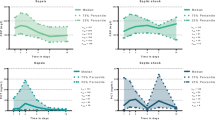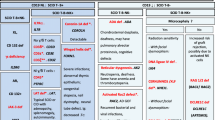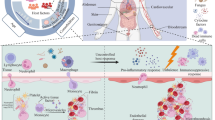Abstract
Activation of protein C plays an important role in modulating coagulation as well as inflammation during severe sepsis. The baseline of activated protein C level in patients with severe sepsis showed interindividual variability between survivors and nonsurvivors, and the decreased level of protein C correlated with organ dysfunction and poor outcome. However, there are limited data concerning the genetic predisposition of individuals carrying two functional polymorphisms -1641A>G and -1654C>T within protein C gene to sepsis. Here we investigated the impact of these two variations on the development of severe sepsis in 240 patients with severe sepsis and 323 healthy controls using direct sequencing. After Bonferroni correction for multiple comparisons, -1641A/-1654C haplotype was significantly associated with the fatal outcome of severe sepsis (P = 0.008, OR 1.739, 95% CI 1.165–2.595), which was confirmed by multiple logistic regression analysis (P = 0.024, OR 2.090, 95% CI 1.101–3.967). Compared to patients without carrying -1641A/-1654C haplotype, the -1641A/-1654C haplotype carriers showed higher SOFAmax scores (10.3 ± 5.2 vs. 9.0 ± 4.5; P = 0.014) and more hepatic dysfunction (P = 0.004, OR 2.270, 95% CI 1.312–3.930). These findings suggest that protein C haplotype -1641A/-1654C is associated with organ dysfunction and is an independent risk factor for the fatal outcome of severe sepsis in Chinese Han population.
Similar content being viewed by others
Abbreviations
- APC:
-
activated protein C
- SNPs:
-
single nucleotide polymorphisms
- SOFA:
-
sequential organ failure assessment
- APACHE II:
-
acute physiology and chronic health evaluation score II
- ICU:
-
intensive care unit
References
Abraham E, Laterre PF, Garg R, Levy H, Talwar D, Trzaskoma BL, François B, Guy JS, Brückmann M, Rea-Neto A, Rossaint R, Perrotin D, Sablotzki A, Arkins N, Utterback BG, Macias WL (2005) Administration of drotrecogin alfa (activated) in early stage severe sepsis (ADDRESS) study group. Drotrecogin alfa (activated) for adults with severe sepsis and a low risk of death. N Engl J Med 353:1332–1341
Aiach M, Nicaud V, Alhenc-Gelas M, Gandrille S, Arnaud E, Amiral J, Guize L, Fiessinger JN, Emmerich J (1999) Complex association of protein C gene promoter polymorphism with circulating protein C levels and thrombotic risk. Arterioscler Thromb Vasc Biol 19:1573–1576
Angus DC, Linde-Zwirble WT, Lidicker J, Clermont G, Carcillo J, Pinsky MR (2001) Epidemiology of severe sepsis in the United States: analysis of incidence, outcome, and associated costs of care. Crit Care Med 29:1303–1310
Annane D, Bellissant E, Cavaillon JM (2005) Septic shock. Lancet 365:63–78
Arcaroli J, Silva E, Maloney JP, He Q, Svetkauskaite D, Murphy JR, Abraham E (2006) Variant IRAK-1 haplotype is associated with increased nuclear factor-kappaB activation and worse outcomes in sepsis. Am J Respir Crit Care Med 173:1335–1341
Barrett JC, Fry B, Maller J, Daly MJ (2005) Haploview: analysis and visualization of LD and haplotype maps. Bioinformatics 21:263–265
Binder A, Endler G, Rieger S, Geishofer G, Resch B, Mannhalter C, Zenz W (2007) Protein C promoter polymorphisms associate with sepsis in children with systemic meningococcemia. Hum Genet 122:183–190
Brunkhorst F, Sakr Y, Hagel S, Reinhart K (2007) Protein C concentrations correlate with organ dysfunction and predict outcome independent of the presence of sepsis. Anesthesiology 107:15–23
Chen QX, Lv C, Huang LX, Cheng BL, Xie GH, Wu SJ, Fang XM (2007) Genomic variations within DEFB1 are associated with the susceptibility to and the fatal outcome of severe sepsis in Chinese Han population. Genes Immun 8:439–443
Cheng B, Xie G, Yao S, Wu X, Guo Q, Gu M, Fang Q, Xu Q, Wang D, Jin Y, Yuan S, Wang J, Du Z, Sun Y, Fang X (2007) Epidemiology of severe sepsis in critically ill surgical patients in ten university hospitals in China. Crit Care Med 35:2538–2546
Cobb JP, O’Keefe GE (2004) Injury research in the genomic era. Lancet 363:2076–2083
Cohen J (2002) The immunopathogenesis of sepsis. Nature 420:885–891
Ely EW, Laterre PF, Angus DC, Helterbrand JD, Levy H, Dhainaut JF, Vincent JL, Macias WL, Bernard GR (2003) Drotrecogin alfa (activated) administration across clinically important subgroups of patients with severe sepsis. Crit Care Med 31:12–19
Esmon CT (2004) Interactions between the innate immune and blood coagulation systems. Trends Immunol 25:536–542
Esmon CT (2005) The interactions between inflammation and coagulation. Br J Haematol 131:417–430
Fisher CJ Jr, Yan SB (2000) Protein C levels as a prognostic indicator of outcome in sepsis and related diseases. Crit Care Med 28:S49–S56
Kinasewitz GT, Yan SB, Basson B, Comp P, Russell JA, Cariou A, Um SL, Utterback B, Laterre PF, Dhainaut JF (2004) Universal changes in biomarkers of coagulation and inflammation occur in patients with severe sepsis, regardless of causative micro-organism (ISRCTN74215569). Crit Care 8:R82–R90
Levy MM, Fink MP, Marshall JC, Abraham E, Angus D, Cook D, Cohen J, Opal SM, Vincent JL, Ramsay G (2003) 2001SCCM/ESICM/ACCP/ATS/SIS international sepsis definitions conference. Crit Care Med 31:1250–1256
Liaw PC, Esmon CT, Kahnamoui K, Schmidt S, Kahnamoui S, Ferrell G, Beaudin S, Julian JA, Weitz JI, Crowther M, Loeb M, Cook D (2004) Patients with severe sepsis vary markedly in their ability to generate activated protein C. Blood 104:3958–3964
Lin MT, Albertson TE (2004) Genomic polymorphisms in sepsis. Crit Care Med 32:569–579
Macias WL, Nelson DR (2004) Severe protein c deficiency predicts early death in severe sepsis. Crit Care Med 32:S223–S228
Martin GS, Mannino DM, Eaton S, Moss M (2003) The epidemiology of sepsis in the United States from 1979 through 2000. N Engl J Med 348:1546–1554
Mesters RM, Helterbrand J, Utterback BG, Yan B, Chao YB, Fernandez JA, Griffin JH, Hartman DL (2000) Prognostic value of protein C concentrations in neutropenic patients at high risk of severe septic complications. Crit Care Med 28:2209–2216
Michalek J, Svetlikova P, Fedora M, Klimovic M, Klapacova L, Bartosova D, Elbl L, Hrstkova H, Hubacek JA (2007) Bactericidal permeability increasing protein gene variants in children with sepsis. Intensive Care Med 33:2158–2164
Mosnier LO, Zlokovic BV, Griffin JH (2007) The cytoprotective protein C pathway. Blood 109:3161–3172
Pinsky MR (2007) Genetics of individualizing patient care. Crit Care Med 35:287–290
Russell JA (2006) Management of sepsis. N Engl J Med 355:1699–1713
Sole X, Guino E, Valls J, Iniesta R, Moreno V (2006) SNPStats: a web tool for the analysis of association studies. Bioinformatics 22:1928–1929
Spek CA, Greengard JS, Griffin JH, Bertina RM, Reitsma PH (1995a) Two mutations in the promoter region of the human protein C gene both cause type I protein C deficiency by disruption of two HNF-3 binding sites. J Biol Chem 270:24216–24221
Spek CA, Koster T, Rosendaal FR, Bertina RM, Reitsma PH (1995b) Genotypic variation in the promoter region of the protein C gene is associated with plasma protein C levels and thrombotic risk. Arterioscler Thromb Vasc Biol 15:214–218
Stuber F (2001) Effects of genomic polymorphisms on the course of sepsis: is there a concept for gene therapy? J Am Soc Nephrol 12(Suppl 17):S60–S64
Toltl LJ, Shin LY, Liaw PC (2007) Activated protein C in sepsis and beyond: update 2006. Front Biosci 12:1963–1972
Vincent JL, Sakr Y, Sprung CL, Ranieri VM, Reinhart K, Gerlach H, Moreno R, Carlet J, Le Gall JR, Payen D (2006) Sepsis in European intensive care units: results of the SOAP study. Crit Care Med 34:344–353
Walley KR, Russell JA (2007) Protein C -1641 AA is associated with decreased survival and more organ dysfunction in severe sepsis. Crit Care Med 35:12–17
Acknowledgments
This work was financially supported by National Natural Science Foundation of China (XMF, No. 30471662) and Program for New Century Excellent Talents in University, Ministry of Education, China (XMF, No. NCET-05-0522). The authors disclose no financial interests that are relevant to the research or constitute a conflict of interest.
Author information
Authors and Affiliations
Corresponding author
Rights and permissions
About this article
Cite this article
Chen, Q.X., Wu, S.J., Wang, H.H. et al. Protein C -1641A/-1654C haplotype is associated with organ dysfunction and the fatal outcome of severe sepsis in Chinese Han population. Hum Genet 123, 281–287 (2008). https://doi.org/10.1007/s00439-008-0476-x
Received:
Accepted:
Published:
Issue Date:
DOI: https://doi.org/10.1007/s00439-008-0476-x




